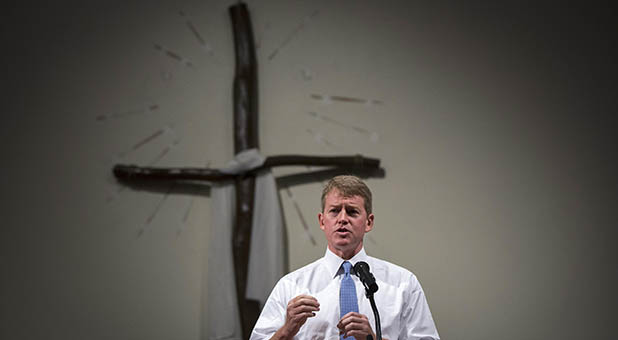The State Does Not Have ‘Imperium’ Over the Church
In theaters this week is a new film about an FBI agent who goes undercover to find and stop white supremacists. While the movie looks like a standard thriller the title is unusual: Imperium.
Imperium isn’t a word we hear very often today. It comes from the Latin for “command” or “empire” and referred to the supreme executive power in the Roman state, involving both military and judicial authority. The word would later be adopted for the term imperator (emperor), a title for the supreme authority within a state.
Today, in Western nations, the state itself is often viewed as the imperium. As Jonathan Leeman points out, the state alone has the power over life and death—the power of the sword.
So if you want to start a business or a school, you need the state’s permission. The same is true for soccer clubs, trade unions or charity organizations. They exist by permission of the state, and the state regulates them. They don’t regulate the state. They don’t have imperium.
While the state has ultimate power over soccer clubs and trade unions, does it have the same authority over churches? No, it doesn’t. As Leeman explains:
Most people in Western societies lump churches into the same category as soccer clubs or charity organizations. Churches are one more kind of voluntary association, we say. Alternatively, we regard churches as a service provider, like a mechanic who services your soul or a gas station that fills up your spiritual tank.
But are local churches clubs or service providers that exist by permission of the state, one more supplicant who depends on the mercy of the lord of the land? It’s true that you as an individual Christian should submit to the authority of the state. But remember that the state is God’s “servant” and God’s “agent” for bringing judgment (Rom. 13:4). Yes, the state possesses the “sword,” but it does so only at God’s behest.
It’s also true that churches should abide by the laws of the land when it comes to regulations such as adhering to building codes (if it has a building) or paying any taxes on staff salaries (if it has a paid staff). In that sense, churches are like every other business or organization.
At the same time, there is one thing that should be utterly clear in a Christian’s mind: the local church does not exist by permission of the state. It exists by the express authorization of Jesus. After all, Jesus has imperium, not the state.
Click here to read more of Leeman’s article.
Joe Carter is a Senior Editor at the Acton Institute. Joe also serves as an editor at the The Gospel Coalition, a communications specialist for the Ethics and Religious Liberty Commission of the Southern Baptist Convention, and as an adjunct professor of journalism at Patrick Henry College. He is the editor of the NIV Lifehacks Bible and co-author of How to Argue like Jesus: Learning Persuasion from History’s Greatest Communicator (Crossway).
















































